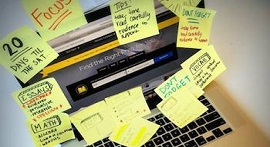For those who believe that possibilities are never out of reach, the University of Washington is the place to learn, discover and create.
Ranked the 10th best global university,* the UW is home to a renowned medical center and top-ranked programs in medicine, engineering, nursing, law, business and social work.
The UW is the country's top public research institution and one of the oldest universities on the West Coast. Our main campus, situated in an urban neighborhood just minutes from downtown Seattle, draws more than 32,000 undergraduates pursuing more than 180 majors. Every year, more than 9,000 students augment their learning with hands-on research.
UW students are not required to live on campus, but 70% of freshmen do, creating a strong and supportive community. Residence halls and other campus facilities are heralded for their environmental sustainability. Hundreds of student organizations and dozens of intramural and club sports enrich the Husky experience.
Our students and faculty turn possibility into reality every day. By pursuing both ideas and ideals — by taking action and inspiring action — the UW community makes a real-world impact.
Do you dare to Be Boundless? At the University of Washington, you can.
*2020 Best Global Universities, U.S. News & World Report
About
From the School
Contact & Visit
Campus Visits Contact
Box 355852
Seattle, WA 98195-5852
Experience College Life
Burke Museum
Meany Hall for Performing Arts
Football games at Husky Stadium
Waterfront Activities Center (WAC)
Suzzallo Library
Seattle Center (MoPOP, Space Needle, Pac Sci Ctr)
Seattle Art Museum/Asian Art Museum
International District
Olympic Sculpture Park
Campus Tours
9am - 4pm
206-543-9686
Dates: Year-round
Times: Varies
Average Length: 1 hour
On Campus Interview
Faculty and Coach Visits
Class Visits
Overnight Dorm Stays
Transportation
Admissions
Admissions
Overall
From The School
Through its admissions process, the UW seeks students who can benefit from its wealth of academic and cultural opportunities and contribute to its boundless energy and rich diversity of experience. Choosing students from a very able group of applicants requires a selection process that looks beyond grades and coursework.
The University uses an individualized application review, the kind more typically found at smaller private universities and colleges. In addition to grades and strength of curriculum, we take into account many aspects of an applicant's achievements and personal history.
Overview
GPA Breakdown
Need to boost your grades? We can help.
Learn MoreSAT & ACT Test Scores
Testing Policies
Deadlines
Regular — November 15
Other Admission Factors
Rigor of Secondary School Record
Academic GPA
Application Essay
Selectivity Rating
Get a personalized plan for a competitive application from an admissions expert.
Learn MoreAcademics
Academics
Overall
From The School
Academic Programs
As an educational powerhouse and the largest university in the Pacific Northwest, the UW offers a broad range of academic programs to enrich learning beyond the classroom. A few examples:
First Year Programs empowers entering students to become engaged and confident learners by facilitating supportive communities and creating educational experiences. Activities include quarterly advising and orientation sessions, Dawg Daze and UWild's First-Year Adventures.
Freshman Collegium Seminars introduce first-year students to the excitement of ideas and the richness of academic discovery. Students learn with our best faculty, exploring big ideas, engaging in deep inquiry, and developing a sense of community with a small group of students. These seminars are an excellent introduction to the intellectual world of the University, and they're a welcoming environment for students still new to the campus. Grading is credit/no credit.
The University Honors Program integrates challenging courses and diverse learning experiences for academically motivated students in a close community of faculty, staff and peers. The core curriculum offers a broad liberal education, while departmental honors programs provide a deep disciplinary education.
The Undergraduate Research Program facilitates research experiences for undergraduates with UW faculty members across departments and disciplines. Since 1997, it has produced the Undergraduate Research Symposium, in which hundreds of undergraduates present their research to the campus and community. It is among the largest symposia for undergraduates in the nation.
The UW Le?n Center supports academic programs that benefit from its unique location in the medieval center of Le?n, Spain. By providing a space for study abroad programs, academic research, conferences, exhibits and cultural events, its goal is to foster understanding and compassion between cultures.
The UW Rome Center is a renovated palazzo in Rome that hosts academic programs ranging from art history to landscape architecture. The facility provides studios, classrooms, a library and computer lab, student lounge, conference room, administrative office and faculty accommodations.
UW Study Abroad extends the UW's global reach, offering more than 600 study abroad and internship options with universities in locations around the world. Students who enroll in short-term programs (often scheduled for 3–4 weeks between academic quarters) might find themselves producing theater in Spain or meeting businesswomen in India.
Majors and Degrees Offered
The UW offers bachelor's degrees in 180 fields of study, including highly ranked programs in business, communication, English, informatics, medicine, oceanography, public health and social work. Graduate and doctoral students choose from 300+ graduate degree programs offered in 16 schools and colleges.
Flexible study options include an online bachelor's degree completion program.
Faculty and Class Information
Graduation Rates
Majors
-
ARCHITECTURE AND RELATED SERVICES.
Architectural and Building Sciences/Technology.
Architectural History and Criticism, General.
Architecture and Related Services, Other.
Architecture.
City/Urban, Community and Regional Planning.
Interior Architecture.
Landscape Architecture.
-
AREA, ETHNIC, CULTURAL, GENDER, AND GROUP STUDIES.
Chinese Studies.
German Studies.
Japanese Studies.
Korean Studies.
Near and Middle Eastern Studies.
-
BIOLOGICAL AND BIOMEDICAL SCIENCES.
Biology/Biological Sciences, General.
Botany/Plant Biology.
Cell/Cellular and Molecular Biology.
Ecology, Evolution, Systematics and Population Biology, Other.
Environmental Biology.
Physiology, General.
-
BUSINESS, MANAGEMENT, MARKETING, AND RELATED SUPPORT SERVICES.
Marketing/Marketing Management, General.
-
COMMUNICATION, JOURNALISM, AND RELATED PROGRAMS.
Journalism.
Political Communication.
Speech Communication and Rhetoric.
-
COMPUTER AND INFORMATION SCIENCES AND SUPPORT SERVICES.
Computer Science.
Informatics.
Information Technology.
-
EDUCATION.
Art Teacher Education.
Early Childhood Education and Teaching.
Mathematics Teacher Education.
Music Teacher Education.
-
ENGINEERING.
Bioengineering and Biomedical Engineering.
Electrical and Electronics Engineering
Engineering, Other.
Industrial Engineering.
Materials Engineering.
Mechanical Engineering.
Mechatronics, Robotics, and Automation Engineering.
Operations Research.
-
ENGLISH LANGUAGE AND LITERATURE/LETTERS.
Professional, Technical, Business, and Scientific Writing.
-
FAMILY AND CONSUMER SCIENCES/HUMAN SCIENCES.
Apparel and Textile Manufacture.
-
FOREIGN LANGUAGES, LITERATURES, AND LINGUISTICS.
Ancient Near Eastern and Biblical Languages, Literatures, and Linguistics.
Comparative Literature.
Middle/Near Eastern and Semitic Languages, Literatures, and Linguistics, Other.
-
HEALTH PROFESSIONS AND RELATED PROGRAMS.
Clinical Nutrition/Nutritionist.
Environmental Health.
Public Health Education and Promotion.
Public Health, General.
-
HISTORY.
History and Philosophy of Science and Technology.
History, Other.
-
MATHEMATICS AND STATISTICS.
Applied Mathematics, Other.
Computational Mathematics.
Mathematics, General.
Mathematics, Other.
Statistics, General.
-
MULTI/INTERDISCIPLINARY STUDIES.
Human Biology.
-
NATURAL RESOURCES AND CONSERVATION.
Environmental Science.
Environmental Studies.
Urban Forestry.
-
PHILOSOPHY AND RELIGIOUS STUDIES.
Ethics.
Islamic Studies.
-
PHYSICAL SCIENCES.
Atmospheric Sciences and Meteorology, General.
Chemistry, General.
Geological and Earth Sciences/Geosciences, Other.
Geology/Earth Science, General.
Geophysics and Seismology.
-
PSYCHOLOGY.
Psychology, Other.
-
PUBLIC ADMINISTRATION AND SOCIAL SERVICE PROFESSIONS.
Social Work.
-
SOCIAL SCIENCES.
Archeology.
Geographic Information Science and Cartography.
Political Science and Government, Other.
Social Sciences, General.
-
VISUAL AND PERFORMING ARTS.
Acting.
Art/Art Studies, General.
Ceramic Arts and Ceramics.
Dance, General.
Design and Visual Communications, General.
Directing and Theatrical Production.
Fiber, Textile and Weaving Arts.
Fine Arts and Art Studies, Other.
Graphic Design.
Industrial and Product Design.
Interior Design.
Jazz/Jazz Studies.
Keyboard Instruments.
Music History, Literature, and Theory.
Music Performance, General.
Music Theory and Composition.
Music, Other.
Musicology and Ethnomusicology.
Painting.
Percussion Instruments.
Photography.
Printmaking.
Sculpture.
Stringed Instruments.
Theatre Literature, History and Criticism.
Voice and Opera.
Students Say
Degrees
Doctoral
Doctoral Other
Doctoral/Professional
Doctoral/Research
Master's
Post-Master's certificate
Career Services
Alumni Network
Alumni Services
Classes
Interest Inventory
Internships
Regional Alumni
Coop
Experiential
Internship
Notable Faculty
Prominent Alumni
Academic Rating
Careers
Graduation Rates
Career Services
Alumni Network
Alumni Services
Classes
Interest Inventory
Internships
Regional Alumni
Coop
Experiential
Internship
ROI & Outcomes
Students Say
Tuition & Aid
Tuition & Aid
Overview
From The School
Tuition, Room, Board and Fees
The UW is proud to be a globally ranked university with a budget-minded price tag. For Washington residents, estimated tuition for 2020–21 is $11,745. Additional expenses, such as room and board, books and supplies, bring the annual total cost of attendance to approximately $29,319.
For nonresidents, estimated tuition for 2020–21 is $39,114, and additional expenses, including room and board, bring the annual total to approximately $56,688.
At the undergraduate level, the UW does not participate in any programs for out-of-state students to pay in-state tuition.
Find more information about the total costs of attendance at the UW.
Find more information about scholarships for incoming freshmen.
Financial Aid
We believe students from all economic backgrounds should have the opportunity to attend the UW. Each year about 55% of undergraduates receive some $400 million in financial aid. We offer a wide array of federal, state and institutional financial aid programs to help students at all economic levels pay for their education. For Washington state residents, the UW offers the Husky Promise, our guarantee to Washington state students that we will not let financial challenges stand in the way of discovering their potential or achieving a UW degree. If students are admitted to the UW and qualify for the Husky Promise, we promise to pay their tuition.
Dates
Required Forms
Financial Aid Statistics
Expenses per Academic Year
Available Aid
Need-Based College/University Scholarship or Grant Aid from Institutional Funds
Need-Based Federal Pell
Need-Based Private Scholarships
Need-Based SEOG
Need-Based State Scholarships
Direct Subsidized Stafford Loans
Direct Unsubsidized Stafford Loans
Federal Nursing Loans
Financial Aid Rating
Student Body
Student Body
Overall
From The School
From the Anime Discovery Project to the Zimbabwean Music Club, UW students can choose from nearly 1,000 student clubs, including a robust Greek community of about 70 sororities and fraternities.
Student Body Profile
Demographics
Students Say
Campus Life
Campus Life
Overview
From The School
Location
The UW is a multi-campus university with locations in Seattle, Bothell and Tacoma, Washington. The primary campus is situated on over 600 acres in the University District, an urban neighborhood north of downtown Seattle. The campus is like a small city, with classic brick and new "green" buildings set among graceful paths and landscaped grounds that take advantage of beautiful water and mountain views.
Campus Facilities & Equipment
As the nation's top public research institution, the UW is home to cutting-edge laboratories led by the top researchers in their fields. Each year, thousands of undergraduates participate in hands-on research investigating everything from brain function to biodiversity.
The UW Quad, famous for its annual profusion of cherry blossoms, was recently named one of the country's 14 most beautiful and iconic quads. Nearby, Red Square is the central gathering place on campus, lined by Gothic buildings and home to our largest lecture halls and performance spaces.
More than a dozen libraries enrich the academic life of campus, including the iconic Suzzallo Library, envisioned as the "soul of the university" when it was built in 1926. An example of the Collegiate Gothic style, the library is an architectural and historical treasure that features soaring arches, stained-glass windows and a venerated reading room.
West of Red Square and Suzzallo Library, the UW's Husky football team has drawn generations of fans to its mammoth Husky Stadium, first constructed in 1920. Perched on the shore of Lake Washington, this beloved landmark offers sweeping views of the Seattle skyline, the surrounding lakes and two mountain ranges. Husky Stadium hosts more than 70,000 cheering spectators at each game.
Off-Campus Opportunities
One of the fastest-growing cities in the country, Seattle is a thriving technology and business hub known for its energetic startup culture. A vibrant arts and cultural scene enriches the Emerald City, while an abundance of nearby lakes, trails and mountains invite adventures into its backyard.
Campus Life
Housing Options
Apartment Single
Disabled Student
Frat Sorority
Theme Housing
Students Say
Special Needs Admissions
Special Need Services Offered
Student Activities
Sports
Basketball
Crew Rowing
Cross Country
Football
Golf
Soccer
Tennis
Track Field Outdoor
Crew Rowing
Cross Country
Golf
Gymnastics
Sand Volleyball
Soccer
Softball
Tennis
Track Field Outdoor
Student Services
Health
Womens Center
LGBT Support Groups
Minority Support Groups
Army ROTC Offered on-campus
Navy ROTC Offered on-campus
Air Force ROTC Offered on-campus
Sustainability
Data provided by Association for the Advancement of Sustainability in Higher Education (AASHE), STARS®, as of March, 2022.
Campus Security Report
The Jeanne Clery Act requires colleges and universities to disclose their security policies, keep a public crime log, publish an annual crime report and provide timely warnings to students and campus employees about a crime posing an immediate or ongoing threat to students and campus employees.
Please visit The Princeton Review’s page on campus safety for additional resources: http://www.princetonreview.com/safety
The Princeton Review publishes links directly to each school's Campus Security Reports where available. Applicants can also access all school-specific campus safety information using the Campus Safety and Security Data Analysis Cutting Tool provided by the Office of Postsecondary Education of the U.S. Department of Education: https://ope.ed.gov/campussafety/#/



















